Jill Stein for the Greens
Air Date: Week of October 4, 2024
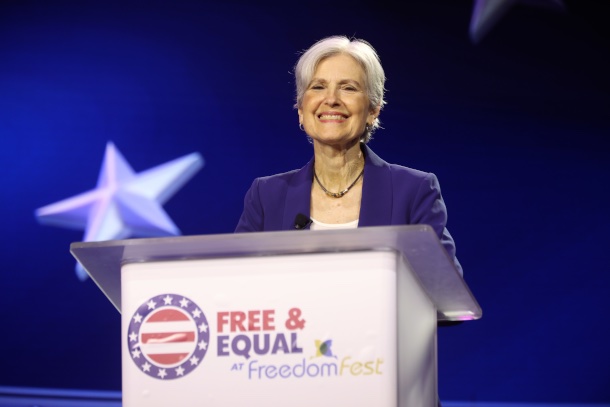
Green Party presidential nominee Jill Stein speaking with attendees at the Free & Equal Elections Presidential Debate at the 2024 FreedomFest at Caesars Forum Conference Center in Las Vegas, Nevada. (Gage Skidmore, Flickr, CC BY 2.0)
Physician Jill Stein, the 2024 Green Party nominee for US President, urges a much quicker phaseout of fossil fuels than either of her Republican or Democratic opponents appear willing to consider. Jill Stein joins Host Jenni Doering to lay out her vision for what she calls a “real” Green New Deal and to push back against claims by Democrats that voting for her in a swing state could hand victory to Donald Trump.
Transcript
DOERING: As we get closer to election day, we are covering the environmental platforms and claims of the presidential candidates. During past weeks we have explored the records and promises of both Democrat Kamala Harris and Republican Donald Trump. This week we’re joined by Dr. Jill Stein of the Green Party. This is not her first presidential race. Jill Stein also ran as the Green Party candidate in 2012 and 2016, getting nearly a million and a half votes in 2016. Although she’s running far behind the two major party candidates in the polls, she could pull thousands of votes in swing states and potentially impact the outcome of the election. Dr. Jill Stein joins me now. Welcome back to Living on Earth!
STEIN: It's great to be with you, Jenni. Thanks so much for having me.
DOERING: So, what are the major environmental issues that the United States needs to address, in your view?
STEIN: I'd say everything, you know, it's like, which is the greatest emergency? I think the climate crisis, it's a unifying issue because it connects to the crisis of temperature and storms and floods and drought and our water supply and our food supply, you know, the survival of our oceans and our forests. So, it's a very unifying issue that kind of brings all ecosystems into focus. Yes, of course, there are many issues that converge here. It's not just the climate, and we put them all together in a green New Deal, which addresses the issues in our economy at the same time that it's addressing many environmental issues that bear on the climate. So, a green new deal would not only change our energy system to clean renewable energy, put conservation and efficiency to work and all that in our homes and our electricity and all energy uses. But then we also look at transportation and the need to move to public transportation system so that we can actually get people where they need to go in a way that is sustainable and workable for a quality of life in our communities. We look at housing also as a critical issue, because housing is a major use of energy, and we also have a housing crisis so why not solve them both at once. And on agriculture we need sustainable systems of agriculture that can endure the very trying conditions of the climate crisis, but which also don't contribute to the climate crisis the way that our current agricultural system does. So, all of those are kind of key needs. If we're going to solve the climate crisis, we also have to solve these other issues.
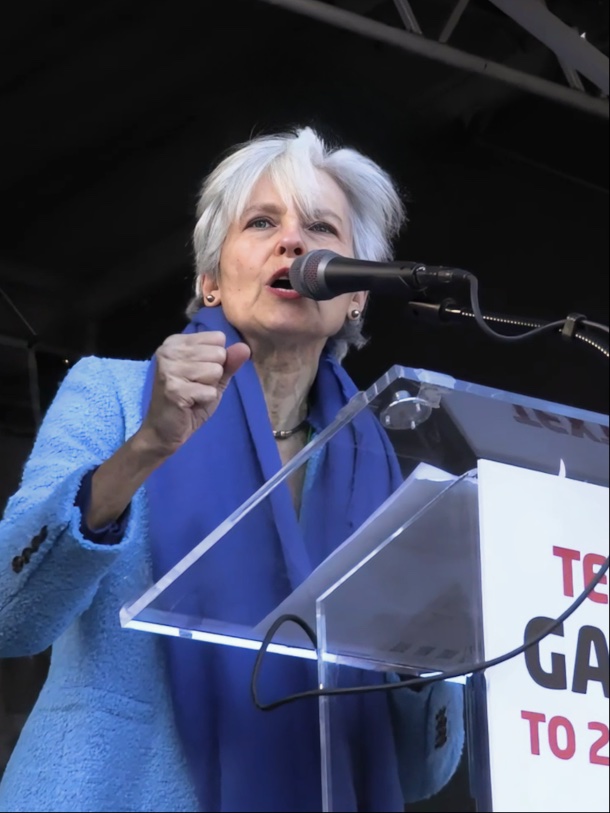
Jill Stein is the 2024 presidential candidate for the Green Party. (Photo courtesy of the Green Party)
DOERING: Now this is not the same as the Green New Deal that many people have heard about. You call yours a "Real Green New Deal". What's different?
STEIN: So, the other one that people have heard about is a knockoff from this. So, this was launched in 2010 in New York by Howie Hawkins, running for governor at the time, and it was adopted by many other green campaigns in this country but before that, it originated in Europe with the European greens, and it really calls for a emergency phase out of fossil fuels. The Green New Deal put forward by AOC and Senator Markey doesn't phase out fossil fuels, it just increases the supply of renewable energy, which is good, that's like a first step, but the climate actually doesn't care about renewable energy. The Climate cares about fossil fuels and CO2 production and greenhouse gas production. So, it's not really a Green New Deal, unless it is phasing out on an urgent basis the production of fossil fuel energy.
DOERING: Now the Green New Deal, it never did actually become law, but the inflation Reduction Act of 2022 has been acknowledged as a big step forward and a major climate accomplishment for the Biden administration. I understand that you disagree. What do you think was missing from it?
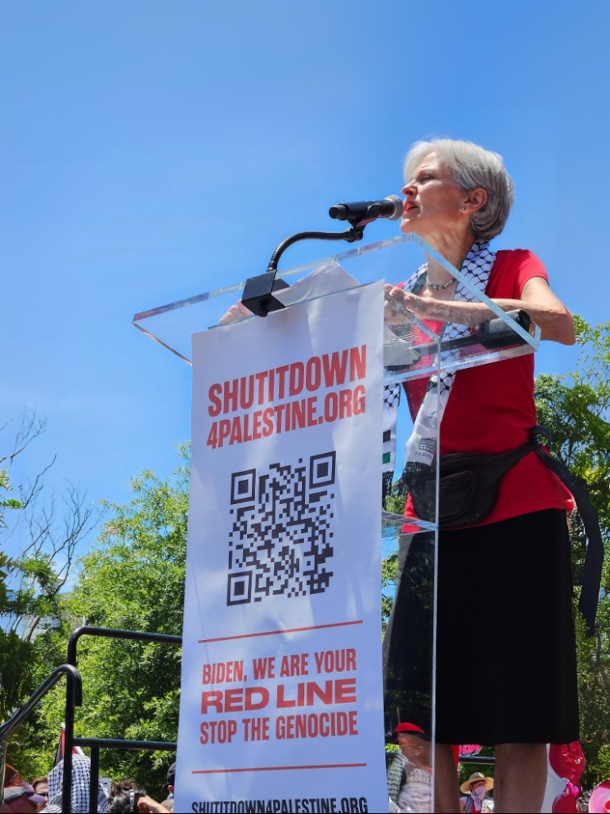
The Green Party calls for a “real green new deal” as well as a permanent bilateral ceasefire in Gaza and Lebanon and a full arms embargo on Israel. (Photo courtesy of the Green Party)
STEIN: The Inflation Reduction Act actually increases; it mandates much greater production of fossil fuels. So, it's going in the wrong direction. It does some good things, it creates some green jobs at the community level, especially but the net balance is drastically in the wrong direction. You may recall that Joe Biden ran for office saying that there would be no sales of public lands for fossil fuel extraction. Well, the inflation Reduction Act, unbeknownst to most people, it requires that millions upon millions of acres of offshore water be auctioned off before any major renewable projects can be built. And the same is true for onshore there need to be 2 million acres auctioned off every year. So, it essentially mandates huge increases in fossil fuel production before any major progress can be made on renewables. So, in my view, that's definitely a huge strike against the Inflation Reduction Act. And it also has money for nuclear energy, which is problematic in the view of Greens, and I think objectively. If you get outside of the hype and the spin, nuclear energy is not going to solve our energy problems and is actually not cost competitive with renewable energy and has no solution for the problem of toxic nuclear waste. So, on many counts this is not the direction that we need to go in.
DOERING: Well, I mean, I imagine that the people involved in passing it and President Biden himself might argue that, you know, we had to make some compromises. You know, overall, does a wonderful job. It's not perfect, but we had to work with Senator Joe Manchin to get his vote. How would you respond to claims like that?
STEIN: I think you can't throw the baby out with bath water. You know, it's like if your compromise is destroying the climate and it's understood that if we're going to fix a climate crisis and prevent it from crossing tipping points that we get closer to by the hour, if we're actually gonna make progress, we have to reduce fossil fuel output. You know, so even the goals that were adopted by the Biden administration, we don't get closer to those goals by selling off millions upon millions of acres for extraction. It's exactly the wrong thing and unfortunately, the powers that be on Capitol Hill are forever finding ways to justify pleasing their big donors and that's the issue here. You know, it's not unique to energy but this is just the way the American system works, which is why we're not solving our problems, whether it's health care or student debt, or the expanding war machine, the housing crisis, we're not solving these problems because at the end of the day it's the industries which are being served by the politicians who are taking their money.
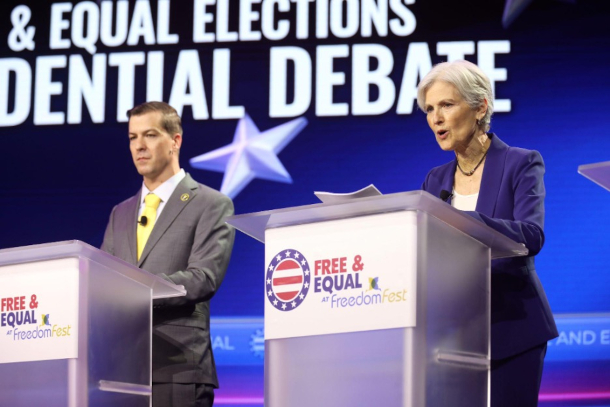
Libertarian Party presidential nominee Chase Oliver and Green Party presidential nominee Jill Stein speaking during the Free & Equal Elections Presidential Debate at the 2024 FreedomFest at Caesars Forum Conference Center in Las Vegas, Nevada. (Photo: by Gage Skidmore, Flickr, CC BY 2.0)
DOERING: Dr. Stein the Green Party has aligned itself with the antiwar movement. How would you characterize the intersection between environment, war, international relations?
STEIN: That's a great question and it's a huge connection. So, for one thing, war blows things up, right? That's just kind of the nature of war, whether it's on the battlefield or in the upper atmosphere or in the oceans, it's blowing things up. So right there, it's destroying the environment, just on a most basic physical level. It's emitting huge quantities of CO2. So, that's another way that cutting back on the military actually saves the climate as well and then there's the whole issue of military pollution. You know, the PFAs epidemic that we're dealing with right now, where every one of us has detectable levels of PFAs in our bodies, and we don't know what the safe level is. If there even is any safe level whatsoever. It's military bases and military operations that are using this PFAs foam. So, the ways that the military destroys our environment is really worth looking at and it again, provides another reason why we don't want to shoot first and we don't want to be, how did Kamala Harris put it, the world's most lethal fighting force. That's not something to pride ourselves on. We want to be the world's greatest humanitarian force, and we want to be working on principles of international law and human rights and diplomacy to avoid war and conflict and to avoid the preparation for war, which both makes war inevitable and also is very polluting and destructive in and of itself.
DOERING: Now during the 2016 presidential election, Green party votes in a few swing states were actually larger than the margin that Donald Trump won those states by. For example, in Michigan, you received over 51,000 votes. Trump defeated Clinton by just shy of 11,000 you also drew more votes in Wisconsin than the margin between the two major party candidates. So, some people say that your votes tipped the election to Trump. And then, of course, when he came into office, he rolled back environmental regulations and took the US out of the Paris Agreement. How do you respond to those who say that voting for you in a swing state could result in a similar outcome in 2024?
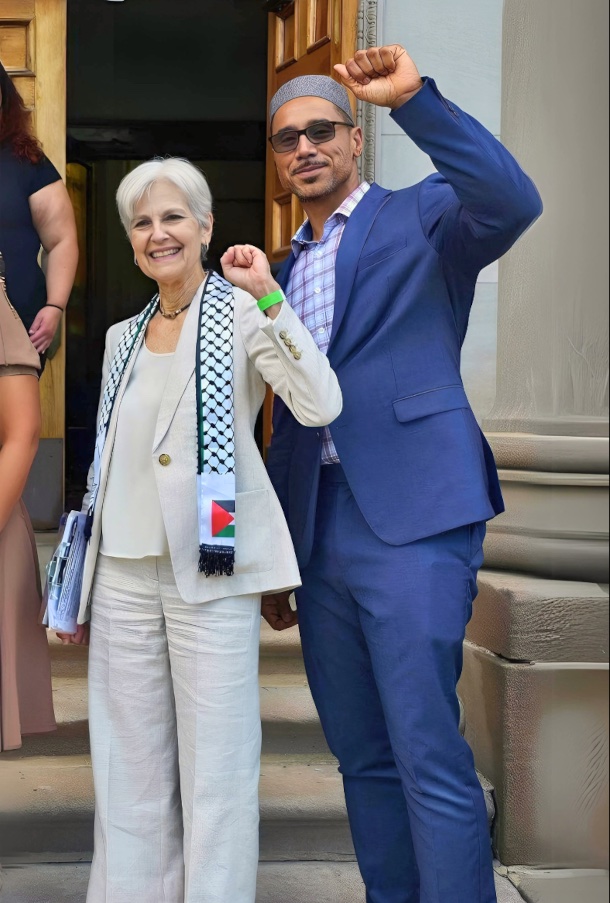
Dr. Jill Stein alongside the Green Party vice presidential candidate Butch Ware, a historian and UC Santa Barbara professor. (Photo courtesy of the Green Party)
STEIN: So let me say it's a very flawed analysis, and I can tell you why, you know, it's a concocted mathematical model which doesn't work because, and let me speak to that point first, and then we can address the other issues. But first of all, the biggest factor out there in the voting population is those who don't vote. In 2020 it was one out of every three eligible voters. It was even higher in 2016 when I was running. So, there are huge numbers who've already voted with their feet, and they say, we reject this system. We know that people who voted green were largely coming from the non-voting pool. So, what third parties largely do is give people a reason to come back in and vote. So, it's absolutely false. It is a really manipulative you know, there's a saying there's lies, damn lies and statistics. These are some of those damn lies through statistics that make people think that your vote was taken away from someone else. For the most part that's not true but let me just back up from that to also say that's what elections are about. Elections are about winning votes and anyone who tells you that your votes belonged to someone because you happen to vote for that party before, you know that's completely false. That is an anti-democratic notion because our lives are changing, the issues are changing. And the question is, what has that politician done for you and what are they offering? And do you believe them? You know, these are the questions here. This problem of potential vote splitting, that maybe there is a progressive group of voters, and they could be diverted among candidates. That is a problem that has long been solved. It's called ranked choice voting, which Greens have been promoting ever since we've been in the political process. We've always been saying "would you please just pass ranked choice voting?". And it's been passed in something like 27 municipalities, t's a great system. The Democrats, in fact, adopt it, but only for their primaries, because it avoids any potential for vote splitting and it ensures that no one is ever going to get elected without a majority and it ensures that you're never throwing away your vote on a candidate who doesn't have the momentum to actually make it into office. Because the way it works is that your choices are ranked. That's why it's called ranked choice voting. So, you could say, oh, I want to vote for this underdog, Ralph Nader say, you know, and Al Gore would be my second choice. That way, if Nader didn't win that election, your vote would be automatically assigned to Gore if there wasn't a winner prior to a runoff. If somebody already has a majority, then you don't need the runoff, and the vote having been split doesn't matter, because somebody has a majority, and what's left outside of the majority wouldn't win the election anyhow. So, it kicks in when it's needed, and it ensures that the vote will never be split, and it ensures that you can go ahead and vote your values, because right now, people are generally voting against who they hate the most instead of voting for what we want. And that's no way to run a democracy. A democracy needs a moral compass. It needs a vision. It needs the idea that we could have a climate that we could live in and green jobs that ensure no worker will be left behind.
DOERING: Dr. Jill Stein is the presidential nominee for the Green Party. Thank you so much.
STEIN: Thank you so much Jenni, good to talk.
Links
Listen to our conversation with Jill Stein in 2016
Learn more about the Green Party
Learn more about Howie Hawkins and the Green New Deal
POLITICO | “Green New Deal won’t call for end to fossil fuels”
Sierra | “The Dark Side of the Inflation Reduction Act”
Learn more about the 2016 Wisconsin presidential election results.
Learn more about the 2016 Michigan presidential election results.
Living on Earth wants to hear from you!
Living on Earth
62 Calef Highway, Suite 212
Lee, NH 03861
Telephone: 617-287-4121
E-mail: comments@loe.org
Newsletter [Click here]
Donate to Living on Earth!
Living on Earth is an independent media program and relies entirely on contributions from listeners and institutions supporting public service. Please donate now to preserve an independent environmental voice.
NewsletterLiving on Earth offers a weekly delivery of the show's rundown to your mailbox. Sign up for our newsletter today!
 Sailors For The Sea: Be the change you want to sea.
Sailors For The Sea: Be the change you want to sea.
 The Grantham Foundation for the Protection of the Environment: Committed to protecting and improving the health of the global environment.
The Grantham Foundation for the Protection of the Environment: Committed to protecting and improving the health of the global environment.
 Contribute to Living on Earth and receive, as our gift to you, an archival print of one of Mark Seth Lender's extraordinary wildlife photographs. Follow the link to see Mark's current collection of photographs.
Contribute to Living on Earth and receive, as our gift to you, an archival print of one of Mark Seth Lender's extraordinary wildlife photographs. Follow the link to see Mark's current collection of photographs.
 Buy a signed copy of Mark Seth Lender's book Smeagull the Seagull & support Living on Earth
Buy a signed copy of Mark Seth Lender's book Smeagull the Seagull & support Living on Earth

